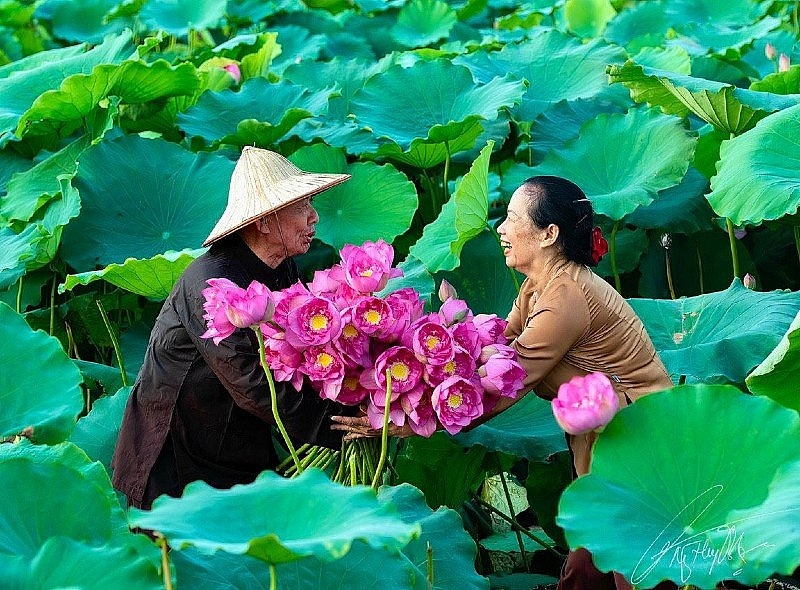Hanoi eyes boost to West Lake lotus brand's economic potential
The topic of developing the economic potential of the West Lake lotus brand was raised at the 2024 Hanoi Lotus Festival, which took place from July 12 to 16, fostering discussions on sustainable exploitation of this unique natural resource.
The lotus has value as a handicraft, artisanal, and culinary product, and can stimulate tourism.
Currently, Hanoi has 600 hectares of lotus cultivation area, concentrated in districts such as Tay Ho, My Duc, Me Linh, and Thach That.
There are 18 products made from lotus plants that have been evaluated and ranked in the One Commune One Product (OCOP) initiative. Notable examples include lotus silk scarves, Quang An lotus tea, Me Linh lotus tea, and lotus sausages, sticky rice, longan sweet soup, jam, and milk, which are exported worldwide.
"Hanoi has a large lotus cultivation area and many OCOPs made from lotus plants, so it should be possible to effectively develop lotus-related tourism. In particular, some localities could become popular destinations in Hanoi, typically Tay Ho district," assessed Dang Huong Giang, director of Hanoi Department of Tourism.
 |
According to Tay Ho People's Committee, the district has a project to expand its lotus plantations to 25ha and grow lotus year-round so that visitors to Tay Ho can admire the beauty, take photos with lotus flowers, and shop for products made from lotus plants all year round.
Regarding development orientation, Le Thi Thu Hang, Secretary of Tay Ho Party Committee, said, "The district is implementing a project to restore the cultivation of hundred-petal lotus in 18 lakes. Along with that, the district is continuing to promote information for people to understand the potential, advantages, and role of lotus cultivation. This contributes to promoting economic development, tourism, and traditional craft village culture in the district."
What the stars mean:
★ Poor ★ ★ Promising ★★★ Good ★★★★ Very good ★★★★★ Exceptional
 Tag:
Tag:
Related Contents
Latest News
More News
- Tet event in Japan celebrates success of 14th National Party Congress (January 25, 2026 | 10:04)
- 14th National Party Congress wraps up with success (January 25, 2026 | 09:49)
- Congratulations from VFF Central Committee's int’l partners to 14th National Party Congress (January 25, 2026 | 09:46)
- List of newly-elected members of 14th Political Bureau announced (January 23, 2026 | 16:27)
- 14th Party Central Committee unanimously elects To Lam as General Secretary (January 23, 2026 | 16:22)
- List of members of 14th Party Central Committee announced (January 23, 2026 | 09:12)
- Highlights of fourth working day of 14th National Party Congress (January 23, 2026 | 09:06)
- Press provides timely, accurate coverage of 14th National Party Congress (January 22, 2026 | 09:49)
- Press release on second working day of 14th National Party Congress (January 22, 2026 | 09:19)
- Minister sets out key directions to promote intrinsic strength of Vietnamese culture (January 22, 2026 | 09:16)





















 Mobile Version
Mobile Version